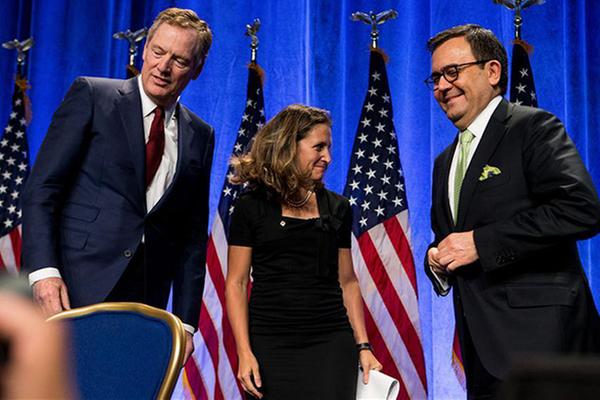US, Canada, Mexico kick off NAFTA renegotiations amid uncertainty
Xinhua | Updated: 2017-08-17 10:38
 |
| US Trade Representative Robert Lighthizer (L), Canadian Foreign Minister Chrystia Freeland (C) and Mexican Economic Minister Ildefonso Guajardo Villarreal attend the first round of renegotiations on the North American Free Trade Agreement (NAFTA) in Washington DC, the United States, on Aug 16, 2017. [Photo/Xinhua] |
Mexico's Economy Minister Ildefonso Guajardo, in his opening remarks, said objectives for NAFTA renegotiations should be to "have more trade" and "do no harm."
"The issue is not tearing apart what has worked, but rather how we can make the agreement work better," Guajardo said, adding negotiators have to work with all participants for successfully reaching a deal.
Jeffrey Schott, a trade expert and senior fellow at the Peterson Institute for International Economics, a Washington DC based think tank, said many US lawmakers are also very reluctant to see major changes to NAFTA because of potential losses or uncertainty over the renegotiations.
"If you ask many of the members, they will say that their constituents have benefited from the NAFTA and they're very reluctant to change what is going on now in part because they know the potential losses," Schott told Xinhua.
"If they don't know what the potential losses are, they are concerned that there will be increased uncertainty and that would be a negative factor for investment," he said.
Schott expected that negotiators from the US, Canada and Mexico would table negotiating proposals for a variety of different issues at this week's round of talks.
"I think there will be a lot of proposals put on the table, detailed texts on a variety of different issues, and a lot of time will be needed just to explain what each country wants to see in this modernization of the NAFTA," he said.
It's still early to say whether the three countries would reach an upgraded trilateral trade deal or the negotiations could break down.
While every member has the option to withdraw from NAFTA six months after it provides the written notice to the other parties, Schott warned the costs of breaking up would be very high "because the economic disruptions to all three economies would be very severe."
"If the US withdrew it, it would cause significant pain for many US exporters including many farmers that rely on the Mexican market for a large share of their crop sales," he said.
























